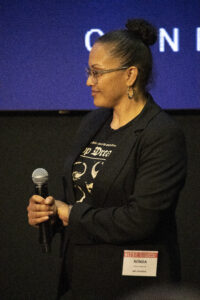M+E Daily

HITS 2023: How NBC Universal is Leveraging EIDR for its Title and Version Strategy
Story Highlights
NBC Universal has been harnessing the power of the Entertainment Identifier Registry (EIDR) to automate its collection of title and version identifiers, as well as metadata, in the company’s content management workflows, Ronda Haralson, technical operations, director, global title management at NBC Universal, said May 23 during the EIDR Annual Participant Meeting (APM) at the Hollywood Innovation and Transformation Summit (HITS) at The Culver Theater.
By leveraging EIDR, NBC Universal is achieving higher efficiency, accuracy and consistency in its operations, ultimately enabling a seamless content distribution experience across multiple platforms, she said during the session “Leveraging EIDR for Title & Version Strategy.”
NBC Universal has been “doing a lot of thinking, especially as the industry has changed,” about there being “a lot more opportunities for our content to be out in the marketplace,” she told attendees. “Metadata title IDs are becoming more and more relevant as well. Important and critical to how we get our content exposed.”
So, “why do we need to even think about title and first title content for a coordinator?” she asked rhetorically. “Content is the core of our industry and that’s all around [the] title,” whether it involves marketing content, distributing content, or creating content, she noted.
But then there is the supply chain, she said, explaining: “A lot of what we do in getting our content out there and at the core and the foundation of our supply chain is title. So, as our content moves through the supply chain and you’re even looking at it as it gets distributed … . So you’re thinking about content as the core of what we do, the foundation of our supply chain. We also have to have a relationship to these titles and our content and a deep relationship so we can know it intimately and how and where it’s going and what it’s doing.”
Overcoming challenges
“What we look at when it comes to title and metadata is the key and important, especially as we start to look at what our goals are and where we’re trying to be and how we’re trying to overcome even some of our challenges,” Haralson said.
Moving on to the goals of NBC Universal and the industry, she said: “We’re trying to maximise our content exploitation and really measure our performance. But we have challenges to achieving that. We don’t know how our content is being utilised out in the marketplace. We don’t always get performance back. We also want to look at how can we expedite our B2C penetration. How can we pivot digitally? And, again, there’s challenges to that.”
 Additionally, she explained that NBC Universal is trying to “drive synergy across our supply chain [to] make it a more frictionless supply chain.” But today, she said: “I think there’s a lot of limited collaboration because you have disconnection complex and even challenging and legacy workflows.”
Additionally, she explained that NBC Universal is trying to “drive synergy across our supply chain [to] make it a more frictionless supply chain.” But today, she said: “I think there’s a lot of limited collaboration because you have disconnection complex and even challenging and legacy workflows.”
Despite the challenges, she thinks “we’re beyond the pivot point and we’re in an action point,” she said.
And that, she said, “really leads us to want to integrate into the media industry ecosystem … . Having that synergy and alignment across the industry is going to be really important because we’re all actually partners in this. And today there’s a lot of challenging B2B transactions as well as collaborations.”
She added: “In order to achieve that, we’ve got to overcome that challenge of interacting business to business. We also want to make data just data-driven decision making. It’s a tongue twister for you…. What’s really key to that is having that leverage and ability to get your insights and analytics to how your content is doing and what is aligned with it.”
She conceded that, “right now, there’s a bit of challenge [because there is an] inability to gain that.”
Also key is viewership, she noted, pointing to the need to have the “ability to track your title and [see] how it’s being viewed across platforms…. Right now, there’s really [a] limit [to] doing that. So I think there’s a lot of challenges but a lot of great goals.”
Helping workflows
“If you’ve tagged the material, you can then bring it back together and you report on different ways your supply chain partners will understand what the heck you’re talking about,” Richard Kroon, EIDR technology director, told attendees. “It all works much better,” he added.
EIDR, meanwhile, has its specific “definitions of how do you draw the line between a creative cut and a technical version” of a piece of content, he said. “In some cases, how do you draw the line between an original work and a version? There are those that want to release a director’s cut as its own new thing. [But EIDR will say] ‘No, that’s actually an edit.’ But ‘I want be a title.’ Well, it doesn’t matter. EIDR calls it an edit. You need to register as an edit but the IDs all look the same.”
But, whether “we call it a creative cut [and] you call it a technical version, we can all still talk about the EIDR ID, and if your supply chain partners have a slightly different definition than you do, which they will, you don’t have to reconcile that at every stage. You can use the EIDR IDs and the automation behind it and the metadata that can be attached to those IDs to keep the workflow flowing without having to stop, reconcile and move forward again.
The Hollywood Innovation and Transformation Summit event was produced by MESA in association with the Hollywood IT Society (HITS) and presented by Amazon Studios Technology, with sponsorship by Fortinet, Genpact, Prime Focus Technologies, Signiant, Softtek, Convergent, Gracenote, Altman Solon, AppTek, Ascendion, Coresite, EPAM, MicroStrategy, Veritone, CDSA, EIDR and PDG Consulting.









